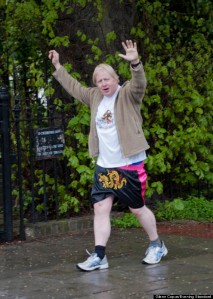
Boris bears many similarities to Douglas Adams’ Zaphod Beeblebrox, and not only because the latter was voted “Worst Dressed Sentient Being in the Known Universe” seven consecutive times
It was with uncanny inevitability that Boris Johnson creaked to a stop, 20-feet above the ground on the Victoria Park zip-wire two week ago. Cynics who have seen Johnson fluffing up his trademark mop before meeting cameramen might have momentarily suspected that it was the invisible hand of premeditation that had brought the Mayor of London to a halt: it was almost unbelievably perfect vintage Boris, and another PR triumph for a man already surfing the waves of public adulation.
Political commentators, deprived of much to talk about by the games, have taken to speculating about whether the Olympics could help Johnson to one day capture Number 10. After the Opening Ceremony, Toby Young opined in the Sun on Sunday that a successful games might make Boris’ “ascension to the top of the Conservative Party…begin to look inevitable”. Forgive me for mining the vein a little further: during the Olympic fortnight Boris performed the role of cheerleader for London, Britain and the games with creditable gusto. But in doing so he has also revealed the limitations that have dogged his political career and must surely rule him out from ever claiming the top job in British politics.
Toby Young strikes on something in his column when he says that his first thought upon seeing Boris on TV at the Opening Ceremony was “Thank God it’s not Ken”. I disapprove of much of Johnson’s politics, so it was a particular surprise to find I couldn’t help but agree. From rallying a nervy capital on the eve of the games with a tub-thumping speech in Hyde Park (blowing a huge raspberry to Mitt Romney in the process) to patenting the “Boris wave” at the beach volleyball, Johnson has performed the role of chief cheerleader for London and the Olympics superbly well, whereas Livingstone would not have had the capability or inclination to do so. Together with the phallic Wenlock and Mandeville, Boris has basically been the third mascot of the games. In contrast Ken backed the Olympic bid not because he was a sports fan but because he was an urban planning enthusiast (he has admitted as much). Having him represent London on the world stage for two weeks in which the capital and the country have been gripped by a sincerely-felt Olympic fervour wouldn’t have felt right.
The implausibility of Ken presiding over the games hints at one of the key strengths which helped Johnson to win the mayoral election. To put it simply, Boris makes many Londoners feel better about themselves and their city than they would under Ken. Johnson has the physique of a latter day John Bull, and during the games he has given the impression of wanting to recast himself as a modern avatar of swashbuckling Britishness (particularly visible when he took to the zip-wire suited and booted, and brandishing two union flags). The idea that Johnson is representative of modern Britain is of course ridiculous, but through his mixture of charm, eccentricity and humour he nevertheless manages to project an image abroad which many Britons are comfortable with.
These are not trifling talents: acting as an ambassador for London is an important duty of the mayor, and neither is cheering people up in gloomy economic times to be sneered at. But needless to say if you aspire to be prime minister it is not enough. The Olympics has not only demonstrated Johnson’s strengths but his weaknesses. His penchant for spectacle is mirrored in his administration, which bereft of big ideas, has tended to focus more on decorating the capital’s physical and cultural landscape (the Thames cable car, the Orbit tower, the remastered Routemaster etc.) than on improving the lives of Londoners in key areas such as transport and housing. While Johnson’s clowning is refreshing, he occasionally risks overstepping into absurdity, and his thirst for attention raises the question of whether he stands for anything other than his own self-advancement.
Boris Johnson may have reached his high-watermark. Being a good figurehead is central to the mayoral role, and this plays to Boris’ strengths, but he will rise no higher without a convincing political programme behind him, a firmer grasp of policy detail, and a bit more seriousness. He is in many ways strikingly similar to Zaphod Beeblebrox, the two-headed extrovert and sometime Galactic President in Douglas Adams’ Hitchhiker’s Guide to the Galaxy. Hedonistic, narcissistic, and irresponsible, but with charisma to spare, Zaphod excels in his role because the presidency exists to attract attention away from those who are really in charge: Boris is a brilliant national mascot, but would you want him pulling the strings from Downing Street?
Leave a comment